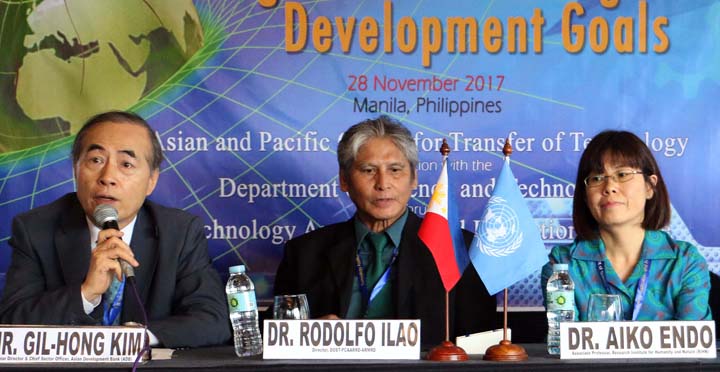A new batch of scholars under the Commission on Higher Education (CHED)-Newton PhD Program will be sent for doctorate studies in their chosen fields and institutions in the United Kingdom (UK) in early 2018.
The scholars—Stephen Doliente, Zyra Evangelista, Joan Pauline Talubo and Paul Dominick Baniqued—were presented to the media last week. They are set to finish their studies within three years.
Program’s fourth
The Newton PhD Programme aims to facilitate the capacity building of individuals, and the building of sustainable, long-lasting links between the UK and the Philippines, British Council Country Director Nicholas Thomas said.
In the Philippines the scholarship initiative, named Newton Agham Programme, has been sending full-time Filipino PhD scholars to the UK since 2014. It is in partnership with Philippine government agencies like the CHED and the Department of Science and Technology (DOST).
This new batch of scholars has increased its PhD scholars to the UK to 22.
The program is cofunded by the government of the UK, particularly the Department for Business, Energy and Industrial Strategy, with the counterpart funding from the Philippines’s CHED and DOST. It is delivered by the British Council in the country.
Newton Programme Manager Andrea Teran said in an interview with the BusinessMirror that the funding from the United Kingdom government “will support tuition and consumable costs of the scholars, while CHED will cover the scholars’ travel, insurance and visa costs, as well as a monthly living allowance for the three years that they are in the UK.”
The UK government’s investment is about £300,000 for the whole three years, while CHED’s International Relations Officer Sebastian Felipe Bundoc said, “we would be investing around P10 million to P12 million.”
The scholars are composed of young researchers in various fields that encompass engineering to psychology.
Biomass utilization and sustainability
For Stephen Doliente of the University of the Philippines, his research focus for PhD in Chemical Engineering at the University of Bath is on biomass. His research will project a chain model that will show the sustainability of the utilization of biomass in the next 30 to 50 years.
“This model will try to answer if we are going to be able to meet our climate-change goals,” Doliente told the BusinessMirror. “We [the Philippines] have signed the Paris Agreement so we need to transition away from using fossil fuels, and one way is to use biomass as a source of energy and chemicals.”
He emphasized that the country has enough biomass to be able o sustain an economy that’s based on it.
“However, the way on how to sustainably use it, wherein we will not disrupt our food system, because we also get our food from biomass, is something that my model will try to answer,” he added.
Doliente hopes that his model will be able to address the issues he raised because he wants it to be considered by legislators as they are considering legislative measures on sustainable source of energy.
“Currently, I think the area that legislators have been considering is only for the biofuel sector. I heard it’s being reviewed and checked,” Doliente added.
Disaster risk and recovery planning
Joan Pauline Talubo, also from the University of the Philippines, will be conducting assessment on the resilience of small island communities in the Philippines for disaster risk and recovery planning. She will have her scholarship at the University of Surrey under the Civil and Environmental Engineering Doctorate Programme.
Talubo, who has performed research on Philippine-Lidar, will focus on the physical environment and look into the socioeconomic characteristic of the community within the island.
“The main difference of my research [from others] would be the use of the companion modeling, which is relatively new in the country,” Talubo said.
Talubo explained to the BusinessMirror that the research would involve the stakeholders, the government and the local community. “Then you do the model with them, so the process will be participatory,” she added.
After she finalizes the maps, the biophysical data and the socioeconomical characteristics of the island, the data would be integrated in the process involving the concerned groups in making the model.
“And then it [model] will be integrated in the planning documents in the local development planning,” she said.
Talubo added that the research aims to bridge the gap of the scientific know-how of the community so the policies and the decision-making at the local level will be scientifically based.
“It will aid to the translation from research to policy,” Talubo noted.
Assessing LGBT inclusiveness in universities
From De La Salle University, Zyra Evangelista’s proposed study on the climate in the campus affecting the well-being of lesbian, gay, bisexual and transgender (LGBT) will be conducted at the University of Glasgow.
“Generally speaking, this kind of study has been conducted by other countries, and the data have shown that LGBT university students, in general, experience bullying and it can affect their academic performance,” Evangelista told the BusinessMirror. “Sometimes, they dropped out of school.”
The reality of the LGBT community in the Philippines is complex. Evangelista aims to conduct a large-scale campus survey to produce the baseline data and help “open the eyes of our legislators because there are antidiscrimination and antibullying bills that have been proposed.”
Evangelista is hoping that her research will help push the bills and become basis for the laws and make the Philippine campuses more LGBT inclusive.
Evangelista said, “I want to make the higher education curriculum in the Philippines more LGBT inclusive. I also want to establish an LGBT psychology program in DLSU when I get my PhD.”
The LGBT psychology is a field that is growing fast but the Philippines is still lagging behind other countries when it comes to researches related to this concern.
Robotics for health applications
Paul Dominick Baniqued has made a research on robotics for medical applications at the De La Salle University. Baniqued is planning to deepen his research at the University of Leeds where he will be researching on neurorehabilitation through the use of robotic exoskeleton, or external robot attached to the body of the patient.
“My research would be focused on the hand,” Baniqued said. “We have this principle, called motor imagery, wherein one would imagine that if your body will move, it will really move because our brains would send the signal.”
Baniqued told the BusinessMirror that when a person experiences stroke, parts of the body could not be moved but there will always be brain signals that would command the body and it can be detected.
“My research would focus on detecting these signals through the program, which I will develop at the university in the UK.”
He cited the principle wherein the physical therapist would repeatedly move a part of the body until it could move by itself.
With the use of his technology, Baniqued said, instead of the physical therapist, it is the robot, which would aid in the therapy. Although he noted that it does not aim to replace the therapists.
He added that the therapist would be trained on how to control the robots, which, in the end, would help both the therapist and patients in the therapy.
“The focus of the research would be to make the robot independent. Our aim is to close the circuitry between the brain and the exoskeleton because the pathways of the signals to the affected area could not be repaired, it is only rewired.”
Through the program, the signals can bypass the broken body pathways so that it will directly command the exoskeleton robot to do the commands and, eventually, it can teach the stroke patients to regain their motor movement until they not need the robotic arm anymore.
Optimistic about his project, Baniqued said he is fortunate with the guidance he is getting from his mentors.
“I’m very glad that my supervisors are multidisciplinary. One is from mechanical engineering, one is from the school of psychology and another two are from the robotics development.”
He said that his supervisors are really passionate about his research and they are really excited when they heard the news. “They have already started preparing my arrival.”
Return service to the country
Although the scholars will be sent off for three years in the UK, they would need to immediately come back home in the Philippines and provide a return service.
“The scholars have also agreed, along with their sending institutions, for a return service plan so there is a define reentry action plan once they come back,” said Marianne Joy Vital, project director of the CHED K to12 Transition.
The Newton scholarship program “answers the need of the universities to scale up during the K to 12 transition for the incoming university students and its an opportunity for universities to develop their faculty,” Vital added. “These PhD scholarships is really targeted toward having our young researchers in our top universities go for their PhD during this transition period.”
The return service aims to integrate the scholars’ research to the extension work because of their relevance in the researches and their applicability toward their economic and social development of the country.
The CHED-Newton PhD Programme also aims to expose scholars to research in other universities and forge linkages with universities in gearing toward internationalization.
Image credits: British Council Photo


































